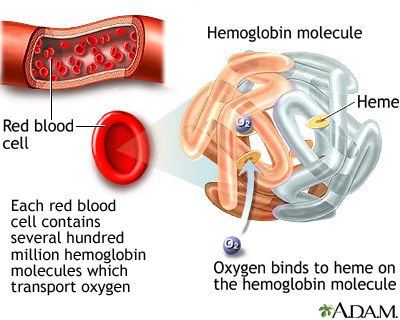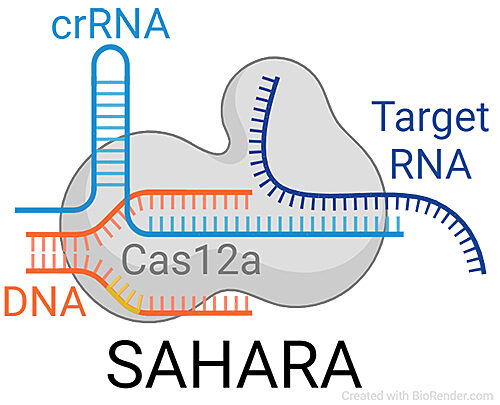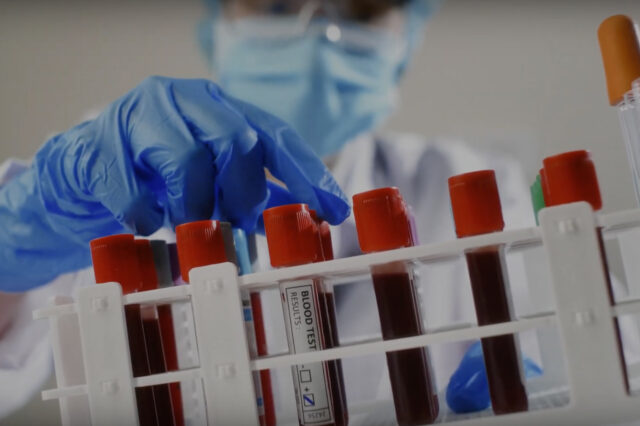- Investigator
- Dima Ezmigna
- Status
- Accepting Candidates
Anemia
Definition
Anemia is a condition in which the body does not have enough healthy red blood cells. Red blood cells provide oxygen to body tissues.
Different types of anemia include:
- Anemia due to vitamin B12 deficiency
- Anemia due to folate (folic acid) deficiency
- Anemia due to iron deficiency
- Anemia of chronic disease
- Hemolytic anemia
- Idiopathic aplastic anemia
- Megaloblastic anemia
- Pernicious anemia
- Sickle cell anemia
- Thalassemia
Iron deficiency anemia is the most common type of anemia.
Patient Education Video: Anemia
Causes
Although many parts of the body help make red blood cells, most of the work is done in the bone marrow. Bone marrow is the soft tissue in the center of bones that helps form all blood cells.
Healthy red blood cells last between 90 and 120 days. Parts of your body then remove old blood cells. A hormone called erythropoietin (epo) made in your kidneys signals your bone marrow to make more red blood cells.
Hemoglobin is the oxygen-carrying protein inside red blood cells. It gives red blood cells their color. People with anemia do not have enough hemoglobin.

The body needs certain vitamins, minerals, and nutrients to make enough red blood cells. Iron, vitamin B12, and folic acid are three of the most important ones. The body may not have enough of these nutrients due to:
- Changes in the lining of the stomach or intestines that affect how well nutrients are absorbed (for example, celiac disease)
- Poor diet
- Surgery that removes part of the stomach or intestines
Possible causes of anemia include:
- Iron deficiency
- Vitamin B12 deficiency
- Folate deficiency
- Certain medicines
- Destruction of red blood cells earlier than normal (which may be caused by immune system problems)
- Long-term (chronic) diseases such as chronic kidney disease, cancer, ulcerative colitis, or rheumatoid arthritis
- Some forms of anemia, such as thalassemia or sickle cell anemia, which can be inherited
- Pregnancy
- Problems with bone marrow such as lymphoma, leukemia, myelodysplasia, multiple myeloma, or aplastic anemia
- Slow blood loss (for example, from heavy menstrual periods or stomach ulcers)
- Sudden heavy blood loss
Symptoms
You may have no symptoms if the anemia is mild or if the problem develops slowly. Symptoms that may occur first include:
- Feeling weak or tired more often than usual, or with exercise
- Headaches
- Problems concentrating or thinking
- Irritability
- Loss of appetite
- Numbness and tingling of hands and feet
If the anemia gets worse, symptoms may include:
- Blue color to the whites of the eyes
- Brittle nails
- Desire to eat ice or other non-food things (pica syndrome)
- Lightheadedness when you stand up
- Pale skin color
- Shortness of breath with mild activity or even at rest
- Sore or inflamed tongue
- Mouth ulcers
- Abnormal or increased menstrual bleeding in females
- Loss of sexual desire in men
Exams and Tests
The provider will perform a physical examination, and may find:
- A heart murmur
- Low blood pressure, especially when you stand up
- Slight fever
- Pale skin
- Rapid heart rate
Some types of anemia may cause other findings on a physical exam.
Blood tests used to diagnose some common types of anemia may include:
- Blood levels of iron, vitamin B12, folic acid, and other vitamins and minerals
- Complete blood count
- Reticulocyte count
Other tests may be done to find medical problems that can cause anemia.
Treatment
Treatment should be directed at the cause of the anemia, and may include:
- Blood transfusions
- Corticosteroids or other medicines that suppress the immune system
- Erythropoietin, a medicine that helps your bone marrow make more blood cells
- Supplements of iron, vitamin B12, folic acid, or other vitamins and minerals
Possible Complications
Severe anemia can cause low oxygen levels in vital organs such as the heart, and can lead to heart failure.
When to Contact a Medical Professional
Contact your provider if you have any symptoms of anemia or unusual bleeding.
Gallery







References
Elghetany MT, Banki K. Erythrocytic disorders. In: McPherson RA, Pincus MR, eds. Henry's Clinical Diagnosis and Management by Laboratory Methods. 24th ed. Philadelphia, PA: Elsevier; 2022:chap 33.
Lin JC. Approach to anemia in the adult and child. In: Hoffman R, Benz EJ, Silberstein LE, et al, eds. Hematology: Basic Principles and Practice. 7th ed. Philadelphia, PA: Elsevier; 2018:chap 34.
Means RT. Approach to the anemias. In: Goldman L, Schafer AI, eds. Goldman-Cecil Medicine. 26th ed. Philadelphia, PA: Elsevier; 2020:chap 149.
Related specialties
Our experts
Clinical Trials: Anemia
UF Health research scientists make medicine better every day. They discover new ways to help people by running clinical trials. When you join a clinical trial, you can get advanced medical care. Sometimes years before it's available everywhere. You can also help make medicine better for everyone else. If you'd like to learn more about clinical trials, visit our clinical trials page. Or click one of the links below:
The objective of this study is to evaluate the efficacy and safety of RBC transfusion for support of acute anemia in cardiovascular surgery patients based on the clinical outcome of renal impairment following transfusion of red blood cells (RBCs)…
- Investigator
- Thomas M Beaver
- Status
- Accepting Candidates
- Ages
- 11 Years - N/A
- Sexes
- All
The main purpose of this study is to evaluate the efficacy and safety of M281 in participants with warm autoimmune hemolytic anemia (wAIHA).
- Investigator
- Anita Rajasekhar
- Status
- Accepting Candidates
- Ages
- 18 Years - N/A
- Sexes
- All
News and Patient Stories: Anemia
UF researchers’ genetic detection discovery has implications for medical diagnostic testing
September 21, 2023
University of Florida researchers have found a new use for “genetic scissors” to detect RNA, a discovery that could lead to faster, more accurate and less…
Department of Molecular Genetics and Microbiology, +4 more

Patient blood management pre-op screening project aims to improve outcomes
July 10, 2023
A new project from the University of Florida College of Medicine is aimed at screening patients ahead of scheduled surgeries to improve their recovery time and…
Department of Anesthesiology, Department of Surgery, +2 more

Latest podcast episodes
Sluggish and tired in the new year? Might be anemia
If you are a senior adult or if you have one in your life, a common health ailment to watch for is anemia. One in six adults over 65 has anemia, a condition that stems from not having enough...
Stroke patients with anemia may have higher death risk
Each year, more than 795,000 Americans suffer from stroke, the leading cause of long-term disability in the United States. Research shows many older adults who have had a stroke also have anemia, a...
Preoperative anemia leads to morbidity and mortality
There are many health issues doctors need to assess before you undergo surgery, and now there are indications that an accurate red blood count is more important than ever. In a study just published...
